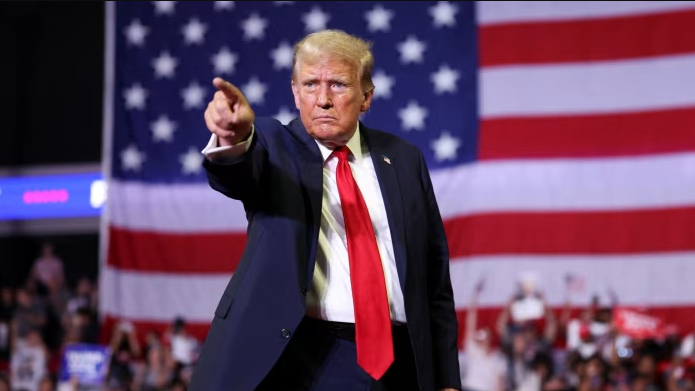
During a recent rally in Aurora, Colorado, Republican presidential candidate Donald Trump called for the death penalty for migrants who kill U.S. citizens or law enforcement officers, intensifying his campaign rhetoric as the November election approaches.

In his Friday night address, Trump reiterated false claims about immigration, portraying the U.S. as facing an “invasion” of migrants. “Now America is known all throughout the world as occupied America,” he declared, tapping into nativist sentiments as he seeks a second term.
Trump outlined aggressive policies he would pursue if re-elected, promising to implement mass deportations. “To everyone here in Colorado and all across our nation, I make this pledge and vow to you: November 5, 2024, will be liberation day in America,” he stated, referencing the upcoming election.
His remarks echoed longstanding efforts to vilify immigrants, particularly as southern border crossings increased under President Biden’s administration. Critics have noted the parallels between Trump’s rhetoric and language historically used by white supremacist groups.
At the Aurora rally, Trump aimed to stoke fears about immigration, often citing the city as an example of migrant-related lawlessness. The narrative has been fueled by misinformation regarding Venezuelan gangs allegedly taking over parts of Aurora—claims local officials have disputed, emphasizing that such fears have been exaggerated.
Aurora Mayor Mike Coffman, a Republican, clarified on social media that concerns about gang activity have been overstated, highlighting the city’s overall safety. Studies show that undocumented migrants are less likely to be arrested for serious crimes compared to U.S.-born citizens, and crime statistics indicate a drop in major offenses in Aurora.
Despite the facts, Trump vowed to “rescue” cities like Aurora from what he described as an “invasion.” He promised the “largest deportation operation in U.S. history” and pledged to close the borders. Trump further invoked racist stereotypes, suggesting that migrants bring contagious diseases into the country.
In outlining his initial plans upon taking office, Trump announced an “Operation Aurora” to expedite deportations of criminal gangs, utilizing an outdated law allowing for the expulsion of foreigners from nations at war with the U.S. He added, “I’m hereby calling for the death penalty for any migrant that kills an American citizen or a law enforcement officer,” which drew cheers from his audience.
As the election season heats up, Trump’s rhetoric continues to focus on anti-immigrant themes, reminiscent of his 2016 campaign. He has long perpetuated conspiracy theories about former President Obama and made inflammatory statements about Mexican immigrants.
Despite the divisive language, immigration remains a top election issue, prompting Trump and his running mate, Senator JD Vance, to emphasize it in their campaign strategy. They have portrayed Vice President Kamala Harris as a “border czar,” misleadingly claiming she supports “open borders.”
While border crossings did surge under Biden, they have since stabilized. In a recent town hall, Harris defended the administration’s immigration policies, pointing to a bipartisan bill aimed at tightening border restrictions that faced opposition from Trump-aligned Republicans.
Amid these tensions, both Trump and Vance have targeted cities like Aurora and Springfield, Ohio, with alarming narratives about immigration. Recently, they amplified unfounded claims about Haitian migrants, despite local authorities debunking such assertions.
As the election nears, the interplay of immigration issues and campaign rhetoric continues to shape the political landscape in the U.S.